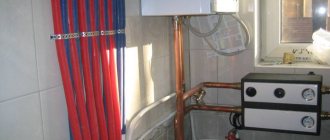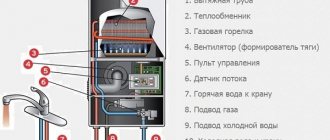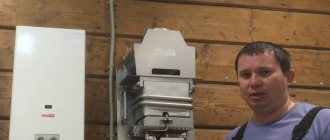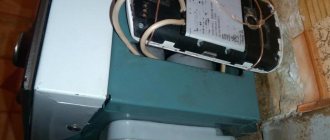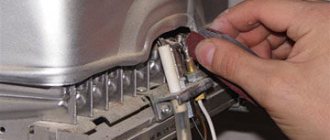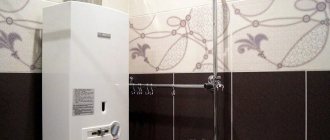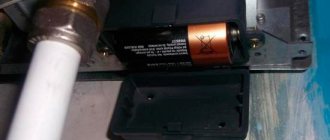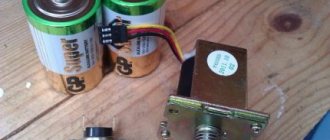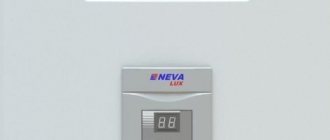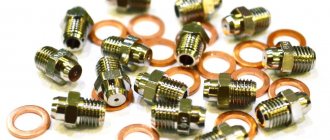Do you live in a house where hot water is constantly turned off or is it not initially provided? Agree that living in such conditions is very unpleasant. In this case, you need to purchase and install additional equipment for heating water, which will save you from this problem. Today, gas water heaters and electric water heaters are the most popular.
Can't decide which is better: a gas water heater or an electric water heater? We will help you solve this problem - the article discusses the features of each of these types of equipment, and also provides a comparative review of important parameters that are decisive when choosing a water heater.
Gas water heaters and their features
Today you won’t surprise anyone with a gas water heater. This is quite popular equipment that is used everywhere. If in the past it was very large and inconspicuous, today these devices are distinguished by relatively small dimensions, as well as a stylish design.
However, the principle of operation of geysers remains the same as before. What is it?
Cold water entering the heat exchanger is heated using natural gas. The main advantage of this heating technology is that even a very large volume of water can be heated extremely quickly.
To read more about the operating principle and design of the column, please follow this link.
Many people cannot imagine even one day of their life without hot water. In order to protect yourself and your loved ones once and for all, it is worth installing a water heater
Another undoubted advantage that makes geysers an ideal option for most buyers is the low price of natural gas. The high performance of geysers has allowed them to conquer a large part of the market in recent years.
You can find gas water heaters of both domestic and foreign production on open sale, but those who would like to purchase 100% high-quality equipment should give preference to products from well-known world brands. Among them are equipment from Electrolux , Neva , Oasis , Bosch and Ariston , although many other manufacturers have also proven themselves well. We talked in more detail about the best geysers in the following rating.

If you live in an old house where there is always no hot water, then a gas water heater is your best friend. Just choose the model you like and arrange installation with a specialist
The models of speakers that can be found on sale differ in the ignition method. Ignition can be either automatic or semi-automatic. With automatic ignition, the device begins to work immediately when the mixer tap is opened. To start equipment with semi-automatic ignition, you will have to use manual ignition of the wick.
Modern geysers are equipped with both convenient and quite informative displays and a variety of indicators. This additional equipment greatly simplifies the process of controlling a gas water heater.
It is worth noting that the columns, like boilers, can be atmospheric (chimney) and turbocharged (flueless). If the first type of equipment uses natural air flow and its removal into the chimney pipe, then in the second type these processes are forced. The turbine is a built-in fan that is used to quickly pump air into the combustion chamber. A turbine is also needed to remove combustion products from the chamber.
Types of heating devices
Heating units come in two types: storage and flow-through. The operating principle of the former is that they first collect water, then heat it for a certain time and distribute it through the pipes. The latter heat circulating water directly during operation.
Depending on the energy carrier they operate with, these types, in turn, are divided into electric or gas water heaters.
In general, the following types of water heating devices can be distinguished:
- electric storage heater or boiler;
- flow-through gas heater or gas water heater;
- flow electric heater;
- storage gas heater.
Initially, the boiler draws water, which is heated by a water heating element - a heating element built into the unit.
The principle of operation of a geyser is that water is heated by the action of a burner flame as it moves in a heat exchanger.
The first two types have proven themselves best and are most widespread. Therefore, the problem usually lies in choosing between these two options.
Briefly about electric water heaters
An electric water heater consists of a water heating regulator, as well as a tubular heater and a thermally insulated tank. The water entering the tank is gradually heated and consumed. Models from some manufacturers are equipped with additional equipment.
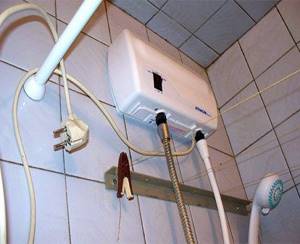
An electric water heater is the best helper for those who are afraid of gas equipment. However, this equipment is unlikely to appeal to those who already pay too much for electricity
The operating principle of an electric heater depends on what type it is. There are flow-through and storage water heaters.
Boilers come with “wet” and “dry” heating elements. The first type (“wet”) is a standard heating element in direct contact with water. Unfortunately, this often leads to corrosion and reduced operating efficiency.
“Dry” heating elements are located in a special design, the surface of which is covered with thermal enamel. Such an unusual solution made this equipment much more durable.
Electric water heaters are often purchased both to supply hot water to a residential building and any industrial facility. Since the heating elements operate automatically, you can easily maintain a certain temperature, and periodic heating will help save electricity. A compact version - a flow-through tap - is installed in the kitchen of a country house or in temporary residences.
Also, modern models are equipped with special thermally insulated tanks, so during heating, energy consumption is minimized. Particularly popular are models equipped with a stainless steel flask. They are more durable and reliable.
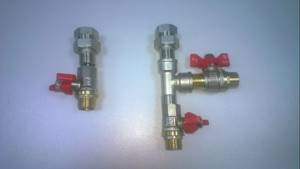
Even if the boiler breaks down, you can fix it at home. You just need to find the right spare parts and carry out the repairs.
Design and mechanism of operation of flow-through heaters
This type of water heating device is a complex design without a water tank. The temperature of the liquid increases a few seconds after turning on the equipment. Popular manufacturers of flow-type heaters include: Ariston, Electrolux, Garanterm, Gorenje, Thermex and others.
The device is a small rectangular panel with a tubular electric heater - heating element.
Main components of the device:
- electric heating elements;
- water supply/outlet pipe;
- electronic control unit;
- Remote Control.
Budget models are equipped with a thermostat, with which you can regulate the heating of the heating element. Premium devices are equipped with a digital control panel. As a result, operation is easier and visually clearer.
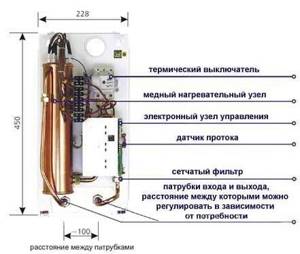
Electric instantaneous water heater diagram
The instantaneous water heater has the following operating mechanism:
- a special flask contains a high-power heating element;
- when the water pump starts, the flowing liquid passes through the heating element;
- if the pressure power is higher, then the water temperature is lower;
- When you close the tap, the device turns off automatically.
Depending on the energy source used, flow heating technology is divided into:
- electrical;
- gas.
Familiarization with the features of each type will help you choose a flow-through heating device.
Powered by electricity
This type of equipment is valued for its small size when heating large volumes of liquid. The model is popular for its simple installation. There are 2 methods used for control:
- regulation of increasing/decreasing water pressure using a mixer;
- by adjusting the power of a tubular heating element (three-level regulator).
Electric heaters are divided into 2 types based on their operating principle.
- Pressure.
This type of instantaneous water heater is an interconnected part of the plumbing system. The pressure in the structure is no more than 6 bar. They are installed near the riser and, at the required power, heat water at several points in the house. Water heaters are not equipped with additional equipment (nozzles or mixers). The device is mounted under the washbasin. The advantages include an electronic control system: after heating, the temperature of the liquid is maintained at a certain level. The disadvantages are significant cost and energy consumption. Electric instantaneous pressure water heater - Non-pressure.
Devices of this type are installed autonomously at some elevation. Cold water is supplied manually or using a pump. The water intake process is carried out under pressure and is located at one point. The kit includes a mixer or nozzle, with their help the liquid is blocked at the inlet. The advantages include easy installation and simple replacement of the heating element. In addition, the device can operate in the absence of electricity or central water supply. This modification is most often installed in city apartments. Electric instantaneous non-pressure water heater
Gas fueled
This type of equipment uses household gas as an energy source. As a result of combustion, a large amount of heat is released to heat the liquid. The device contains a burner that maintains a high temperature at the outlet. With electric ignition, the gas heater starts automatically - you just need to open the hot water mixer.
The power of devices can be low (from 17 to 19 kW), medium (from 22 to 24 kW), maximum (from 28 to 30 kW). Flow-through gas heaters are more economical than electric ones. If water is needed for a shower, you need to choose a water heater of medium and low power. For use in the kitchen and bathroom, gas appliances with a power of more than 24 kW are used.
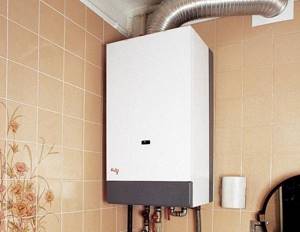
Comparison of geysers and electric water heaters
To decide which type of water heater is better to choose, gas or electric, you must also take into account the conditions in which they will be used. Each type of water heating device has both its advantages and disadvantages. Next, we will conduct a comparative analysis of columns and electric boilers according to the main parameters that are important when choosing.
Criterion #1 - equipment dimensions
The main advantage of a geyser is its compactness. This is extremely important for those who are going to install it in a fairly cramped room. However, small speakers will not satisfy large needs.
Electric water heaters are quite large in size, so they can hardly be recommended to those who would like to install this device in a small one-room apartment.
Criterion #2 - water heater performance
But geysers will help provide the whole house with hot water in large volumes. Electrical equipment cannot boast the same high speed of heating water and the short amount of time required for heating.
Simple arithmetic: on average, a gas water heater can heat 17 liters of water per minute, and an electric boiler will take 20 minutes to heat the same volume of water. This is a significant difference that cannot be ignored. For example, to provide a small family with hot water for the whole day, you will have to wait 5 hours.
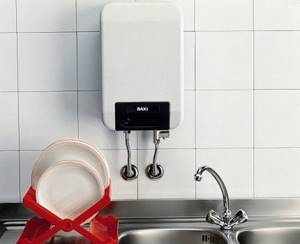
Often, buyers install a boiler directly in the kitchen. This is a completely reasonable decision. By installing such equipment in a living room, you can completely ruin the interior
Criterion #3 - cost-effectiveness of devices
Don't forget about efficiency. It should be noted that it is difficult to compare the efficiency of equipment due to different power sources for gas water heaters and electric water heaters and different prices in the regions.
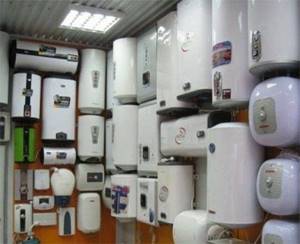
On open sale you can find dozens of models that have minimal differences from each other. In order to choose the right model, you should carefully study the market
Therefore, in order to find out what is more profitable to install in your home, a gas water heater or an electric water heater, you need to carefully study the prices for electricity and gas.
So, if you live in a region where electricity is very expensive, then it is more advisable to consider a gas type water heater.
Criterion #4 - service life and maintenance
Another advantage of geysers is a longer service life.
However, gas equipment is considered more dangerous. It is necessary to check the column regularly, but doing this yourself is not recommended. You should seek qualified help - routine inspection, testing and repairs will be carried out by specialists from the gas company with which you entered into an agreement. Only a specialist can prevent gas leaks.
As for maintenance, owners can clean the column themselves. We recommend familiarizing yourself with DIY maintenance methods.
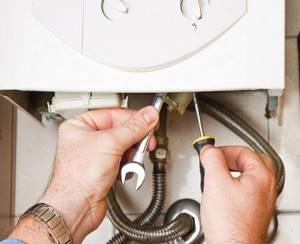
Connecting a gas water heater can only be entrusted to a specialist. You are not allowed to install it yourself if you have never done this before
Problems often arise with electrical equipment. For example, you will have to carefully monitor the voltage. If you live in a private house where there are often problems with the power supply, you will have to buy a stabilizer - it will help avoid problems associated with power surges.
Also, in an electric water heater, it is necessary to constantly remove deposits from the heating element. Otherwise, it may quickly fail and the heating element will need to be replaced.
Criterion #5 - installation of equipment
Before installing a gas water heater, you will have to collect an impressive package of documents. Only after this can installation permission be obtained, and installation work must be carried out by qualified specialists. They will install the gas pipeline and also make sure that the ventilation system is fully operational.
Otherwise, using the equipment is extremely dangerous, and such a user will face significant fines for unauthorized connection.
In order to install a gas appliance, you will have to buy metal pipes. Geysers heat up much more intensely, so plastic pipes may not withstand the load. It can be added that installing a geyser is an extremely difficult task, because gas equipment must be attached directly to the wall, and the wall itself must be properly prepared.
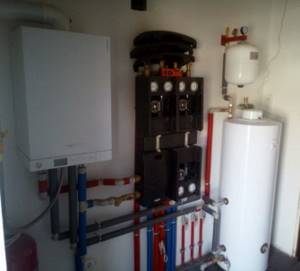
Don't rush into repairs if you don't understand it. First you need to study the internal structure of this equipment
In the case of an electric water heater, everything is much simpler, because during installation work you can use cheap plastic pipes. Anyone can install electrical equipment.
You can cope with this task yourself if you have at least general information about how to connect devices to the electrical and water supply networks. If you already have few free walls where you could install a water heater, then a flow-through type of water heater will be the best option.
Criterion #6 - device security
Gas water heaters are considered more dangerous due to the possibility of gas leakage. We recommend that you familiarize yourself with the reasons for the explosion of geysers.
Electrical equipment can also cause harm to health, but this happens much less frequently.
How does a boiler work?
An electric storage water heater operates on the principle of a thermos. Maintains the preset temperature of water supplies and periodically warms them up.
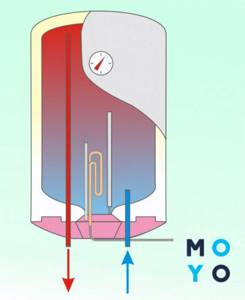
This is a simple device that consists of a tank with good thermal insulation, a heating element - hidden in a flask or directly in contact with water, and a temperature sensor located on the panel. The main thing here is to choose the appropriate volume:
- If you take a tank of up to 50 liters, you risk constantly suffering from a lack of boiling water;
- and if you buy a huge one with a capacity of 150-200 liters, you will overpay for electricity.
Flow models are the absolute opposite of storage models. They heat water instantly and in unlimited volume. But if you open the faucet in the bathroom and the kitchen at the same time, it’s a big deal. The water will not have time to warm up. The result is a stream at room temperature.
Advantages of a boiler based on three criteria
The “advantages” of an electric water heater are obvious.
- Works quietly.
- There is no need for ventilation.
- Capable of providing boiling water to several intake points at once.
- Safe.
- Produces efficiency up to 99.95%.
Let's consider three components that affect ease of use and energy intensity: temperature conditions, tank material, type of heating element.
An economical drive (Ariston, Bosch, Gorenje) consumes, on average, up to 1 kW per day when turned on. And if we take into account the heating time, which depends on the volume of the tank and the power of the device, an interesting picture emerges. So consider it.
Temperature
Let's say we set the temperature to 65°C - optimal for preventing the appearance of bacteria in the water. The table shows the average time period during which the device heats water.
| Boiler power | Tank volume up to 50 l | Tank volume 80 l | Tank volume 100 l |
| 1500 W or less | ≈ 1 hour | ≈ 2 hours | ≈ 2.5 hours |
| up to 2000 W | ≈ 40 min | ≈ 1.5 hours | ≈ 1 hour 40 min |
| 3000 W and above | ≈ 25 min | ≈ 50 min | ≈ 1 hour 20 min |
It’s easier with a flower - while the stream is flowing, the device consumes kW(s). They closed the mixer and stopped the report.
Note: What is important to know about boilers: something that was a secret to many
Tank material
Any coating on the tank inside water heaters is designed to repel scale. But there’s still no escape from it; it will accumulate. Therefore, the degree of resistance to deposits depends on the type of internal coating. It also directly affects the cost of the product.
- Titanium coated steel is baked at 1200°C. This tank is very resistant to high temperatures. The water in it heats up faster than usual.
- Models with enamel coating are as wear-resistant as stainless steel. They transfer heat well and do not crack when heated, because the additives in the chemical. The composition of the enamel is endowed with adhesion properties. The metal “stretches”, and along with it the enamel.
- With glass-titanium or glass-ceramic coating - elite devices. They have an impressive manufacturer's warranty. The glaze is baked in several layers, so it is extremely durable and malleable when the metal expands. The water in such tanks is never stale.
Heating element type
Storage water heaters are distinguished by two types of heating elements, which affect the durability of the device.
- A “wet” heating element is immersed in water. It works on the principle of a boiler. Layering forms on it more quickly, causing thermal conductivity to deteriorate. Such boilers must be cleaned once a year. Otherwise, they will heat water more slowly and fail faster.
- The “dry” heating element is in the flask. It does not come into contact with water, is not subject to attacks by scale, and therefore does not burn to the limit when heating boiling water. Its heat output is doubled, its service life is longer and the cost is an order of magnitude different from a unit with a submersible heating element.
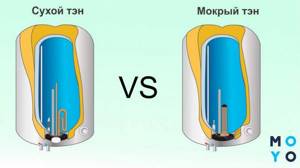
Boiler efficiency
The rationality of any device depends on energy efficiency. Boiler is no exception. However, the advantages of all electric water heaters are negated by their energy intensity. They “eat” kilowatts for the wrong reasons: the more powerful the device, the more expensive it is. Not every apartment can handle the wiring, so this point should be taken into account.
- Protochniki pull up to 27 kW/h. You can’t install it in Stalinist and Khrushchev era buildings. Or you will have to lay a separate cable to the distribution panel. You can’t do this without a master, you understand.
- Storage devices up to 8 kW can be connected to a regular outlet with a voltage of 220 V. More powerful units can only be connected to a connector with a three-phase voltage (380 Volts). Apartments with electric stoves are equipped this way.
Judging by the reviews on the forums, and taking into account my own experience, if you use a boiler instead of centralized hot water, the difference in paying for utilities is within one hundred UAH (for a family of three people). It seems like a little. But a boiler is still more profitable than the services of Kievenergo.
By the way: Types of boilers: find out how to choose a water heater for a cottage or apartment
Conclusions and useful video on the topic
It is possible to give a definite answer about the benefits of purchasing a gas or electric water heater only taking into account the purpose of purchasing this equipment and the characteristics of the room where it will be installed:
In retail chains, markets and online stores you can find a huge selection of water heaters for every taste and budget. However, the most important thing is to take into account the characteristics of the room where you are going to install this equipment. Do not forget about the purpose of the purchase, because if this equipment is needed only for a couple of days a year when there is no hot water, you should not buy a very powerful boiler.
Don’t rush into purchasing – carefully analyze your conditions and needs, and then you will definitely be able to find the right option for you and your family members.
What type of water heating equipment did you choose? Share your experience of use with other visitors to our site, tell us if you are satisfied with your device or if you think you made a mistake in your choice? Express your opinion, participate in the discussion - the comment form is located below.
Removal of combustion products
There are two types of geysers depending on the method of removing carbon monoxide.
The first type is classic, with a chimney. In most apartments that are being converted to use gas heating devices, it is not acceptable, since there is simply no technical possibility of installing a chimney and venting it to the roof.
The second type is chimneyless (parapet). A hole for removing combustion products is made in the wall of the building. This type of equipment is somewhat more expensive and is energy-dependent, since removal occurs forcibly using a fan installed in the column housing. The room in which the chimneyless gas water heater is installed must have good natural or forced ventilation. The extraction is carried out forcibly using a turbine or fan built into the extraction pipe.
Particular attention should be paid to rooms with installed plastic windows. Lack of air access may affect the operation of the device
Provided that there are appropriate detectors, the column simply will not turn on. If they are not there, the result may be very disastrous. A ventilation valve that you can embed into the plastic part of the window with your own hands will help solve the problem. valve designs can be quite complex with multi-stage filters and the simplest and cheapest.
Flaws
Despite the numerous positive aspects, geysers also have disadvantages. Experts note the following disadvantages:
- The premises require additional equipment. For normal and safe operation, it is necessary to ensure the flow of fresh air and the removal of combustion products. The room where the column will be installed must be equipped with a good ventilation system and a chimney must be installed there.
- Disadvantages include constant maintenance. The design uses elements made of non-ferrous metal. With frequent contact with an open flame, they begin to fail. It is necessary to constantly monitor the condition of the main elements, remove soot and monitor the condition of the chimney.
- Installing a geyser will require additional costs for design documentation. Without this, regulatory structures, in particular gas workers, will not allow operation.
- Some experts note another disadvantage - safety. Quite often you can hear about explosions in private and apartment buildings. During operation, you should constantly monitor the presence of water. But modern equipment has many additional sensors that help ensure safe operation.
- Requirements for water pressure. A number of inexpensive models require a certain system pressure. If the pressure is small, then the column simply will not turn on. This is especially true for residents of the upper floors of apartment buildings.
Another drawback, but not so significant, is the relatively low level of efficiency. In the case of a gas water heater, it approaches a value of 92 percent. If we are talking about the closest competitor, a boiler, then the efficiency of this device is almost one hundred percent.
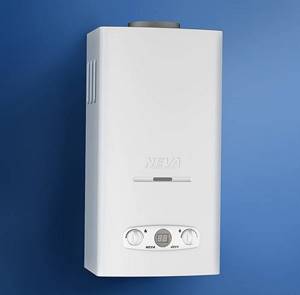
Comfort of use
It is more convenient to use an electric boiler than a gas water heater. First of all, because it is possible to install the lowest water pressure on it, since its functionality does not depend on water flow.
In addition, when connecting an additional water point, the heating temperature will not drop, as in the column. Both units require annual descaling and inspection. The heat exchanger of the column needs to be cleaned of soot, the electric boiler is descaled and the magnesium anode is replaced. As is obvious, it is difficult to clearly give preference to one or another device. Everything will depend on the wishes of the subscriber. For those who need maximum comfort, it is preferable to purchase an electrically heated water heater.
For those who consider efficiency more important or have restrictions on the placement of the unit, it is preferable to choose an economical geyser.
